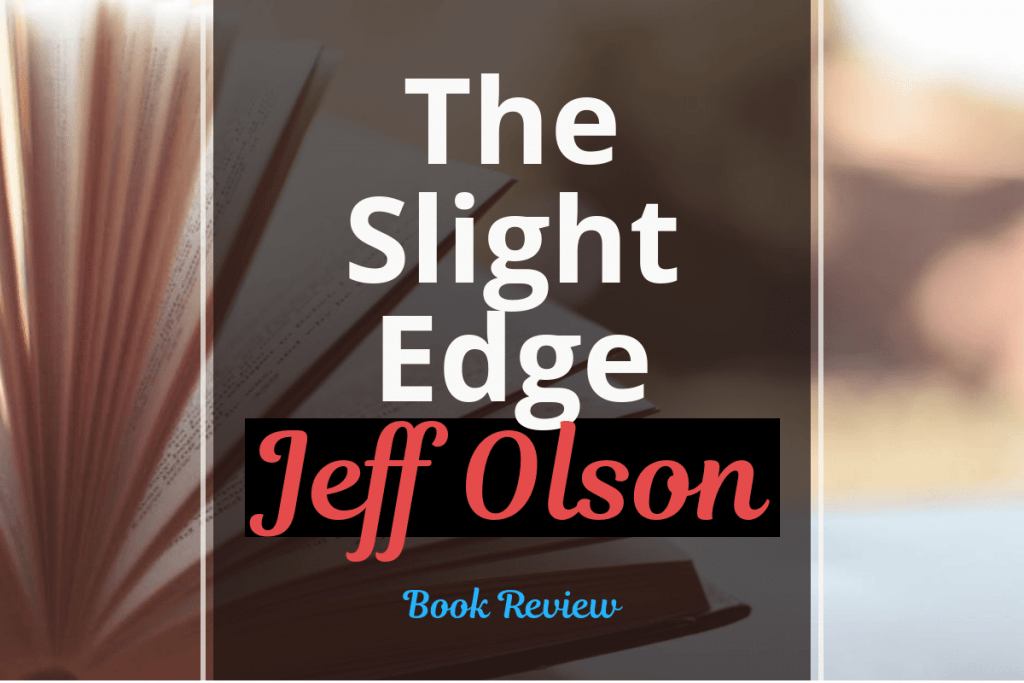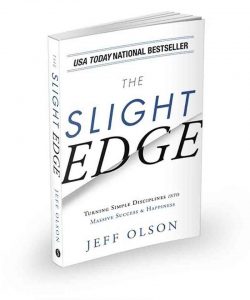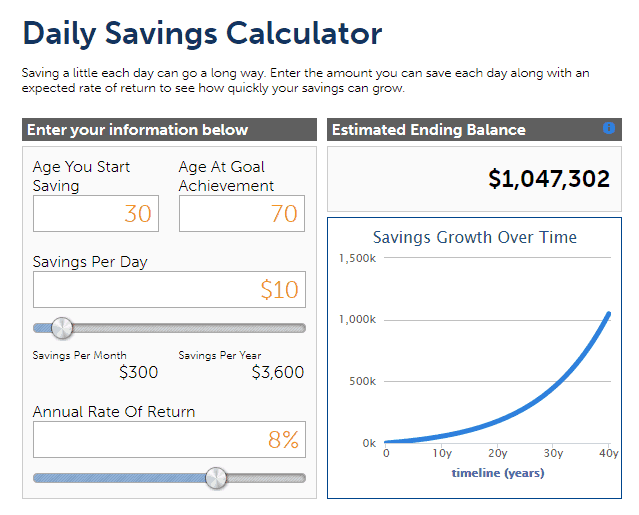🖊 This article was last updated on June 12, 2019
What's easy to do, is easy not to do Click To TweetIn order to get better at time management and productivity myself, I consume a lot of personal development content in the form of articles, books, podcasts, courses, and training. One of the books that had a big impact on me is The Slight Edge by Jeff Olson. Whenever I read a book I take notes (often a lot of them!), so I decided to a summary of my notes with you. I hope it you find it useful.
Summary
The main (and only) concept in this book is the compound effect of your habits and choices, something the author, Jeff Olson, calls the Slight Edge. Everything you do, every decision you make, every action (and inaction!) has a slight positive or negative impact on the final outcome (according to the author, there is no neutral here, and I tend to agree).
But just like compound interest, all these slight choices and actions stack up over time, creating a huge momentum in either a positive or a negative direction. According to the author, it is very, very rare that success (in business, personal finance, health, relationships, …) is the result of a “big leap” or overnight success. It is rather the effect of the compound of small, almost insignificant, actions over time.
But if success is the result of such a simple thing, how does it seem so unattainable for most people? Jeff Olson repeatedly answers this question with the small, but very powerful phrase: “what’s easy to do, is easy not to do”. Is it easy to read 5 pages of a personal development book each day? Of course, it is. But it’s also very easy to just skip today, and then tomorrow, and the day after that… Same goes for journalling, meditation, exercise, eating healthy, …
Skipping one day doesn’t seem to be a big deal, but it’s important for at least two reasons:
- If you don’t do it, you’re starting to break a habit (which can go out of the window reaaaaally quickly)
- It’s only through individually insignificant actions that massive rewards are attained
Saving 10 dollars today doesn’t seem to make a difference in the grand scheme of things, but saving 10 dollars every day will make you a millionaire in 40 years (at an average 8% interest rate)
Chapters
- Part 1: How The Slight Edge Works
- Chapter 1 – The Beach Bum and The Millionaire
- Chapter 2 – The First Ingredient
- Chapter 3 – The Choice
- Chapter 4: Master The Mundane
- Chapter 5 – Slow Down to Go Fast
- Chapter 6: Don’t Fall For Quantum Leaps
- Chapter 7 – The Secret of Happiness
- Chapter 8 – THe Ripple Effect
- Chapter 9 – But You Have to Start With A Penny
- Part 2 – Living The Slight Edge
- Chapter 10 – Two Life Paths
- Chapter 11 – Mastering the Slight Edge
- Chapter 12 – Invest in Yourself
- Chapter 13 – Learn From Mentors
- Chapter 14 – Use Your Slight Edge Allies
- Chapter 15 – Cultivate Slight Edge Habits
- Habit #1: Show Up
- Habit #2: Be Consistent
- Habit #3: Have A Positive Outlook
- Habit #4: Be Committed To The Long Haul
- Habit #5: Cultivate A Burning Desire Backed By Faith
- Habit #6: Be Willing To Pay The Price
- Habit #7: Practice Slight Edge Integrity
- Chapter 16 – Three Steps To Your Dreams
- Chapter 17 – Living the Slight Edge
- Chapter 18 – Where to Go From Here
My 5 favorite quotes
I highlighted quite some quotes, sentences and paragraphs in this book. Here are my 5 most favorite bits:
Because the answer is only the answer—it isn’t actually doing the thing. It isn’t applying the answer, living the answer. It’s only information. Click To Tweet The formula for success is quite simple: Double your rate of failure - Thomas J. Watson (Founder of IBM) Click To Tweet The single most important thing I can tell you about the slight edge is this: it’s already working, right now, either for you or against you. Click To Tweet My point is simply that there is a cost to waiting. It’s never too late to start. It’s always too late to wait. Click To Tweet And that’s the problem. The things that create success in the long run don’t look like they’re having any impact at all in the short run. Click To TweetWho’s it for
This is one of those books that’s full of little nuggets of wisdom and great quotes. It
If you’ve already read Darren Hardy’s “Compound effect”, you probably won’t walk away with lots of new insights.
But it’s definitely a good read for you if:
- you’re struggling with finding the motivation to start new habits or stop with any bad habits (exercise, eating healthy, flossing, …).
- you want to learn more about what it takes to be successful and what the difference is between successful and unsuccessful people
- you struggle with procrastination
- you’re interested into personal development
My takeaways
Although I really liked the book, and definitely recommend it, I didn’t like every part of it. Something I didn’t like, for example, was the parable of a father who gives his 2 sons a choice: they can have 1 million dollars today, or one penny that doubles over time. Of course, in this hypothetical example, the second choice would be the best, as after 30 days you would end up with 10 million dollars. What bothered me most by this parable is that it has actually nothing to do with the concept of the Slight Edge. Unless you have a penny-doubling machine in your basement, it’s just a moot point. It would have been a minor detail if the author didn’t come back to the parable for 3 or 4 times throughout the book.
There was also a lot of repetition in the book and although it’s a quick read, it could definitely have been shorter. Sadly, this is a trend that I see more and more in non-fiction books and probably a requirement of the publisher (it’s hard to sell a 30-page booklet for $15), so I won’t hold it against the author. Something else that I didn’t really appreciate is that the author seems to like to toot his own horn a little too much to my taste, but that may have been my allergy for guru’s that was kicking in.
All in all, though, it’s a great book. What really stuck with me is that “what’s easy to do, is easy not to do” and that every (in)action, however small it may seem, has the potential to have a huge positive or negative impact in the long run. The concept of compounded choices/actions is something that totally aligns with my own views on habits and success, so it’s a concept that helps to guide my daily choices.
This was definitely a nice read for me, and I’m sure it will strike a chord with a lot of other readers as well.
You can get it here on Amazon if you want to add it to your collection.
- These Black Friday deals will skyrocket your productivity (2021 edition) - November 11, 2021
- How to Stay Productive as a Digital Nomad - December 23, 2019
- When is the right time to outsource? - December 3, 2019




The thing is, you’ve read the compound effect so you my already understand that 1p a day is better than getting 1 million right now. However a majority of people does not understand that concept at all and would probably go for the 1 million now. Plus, he was talking about compounding, so every little action adds up even though the actions seem to be very small right now, it will add up over time. So for me, I feel that that parable fitted quite well.